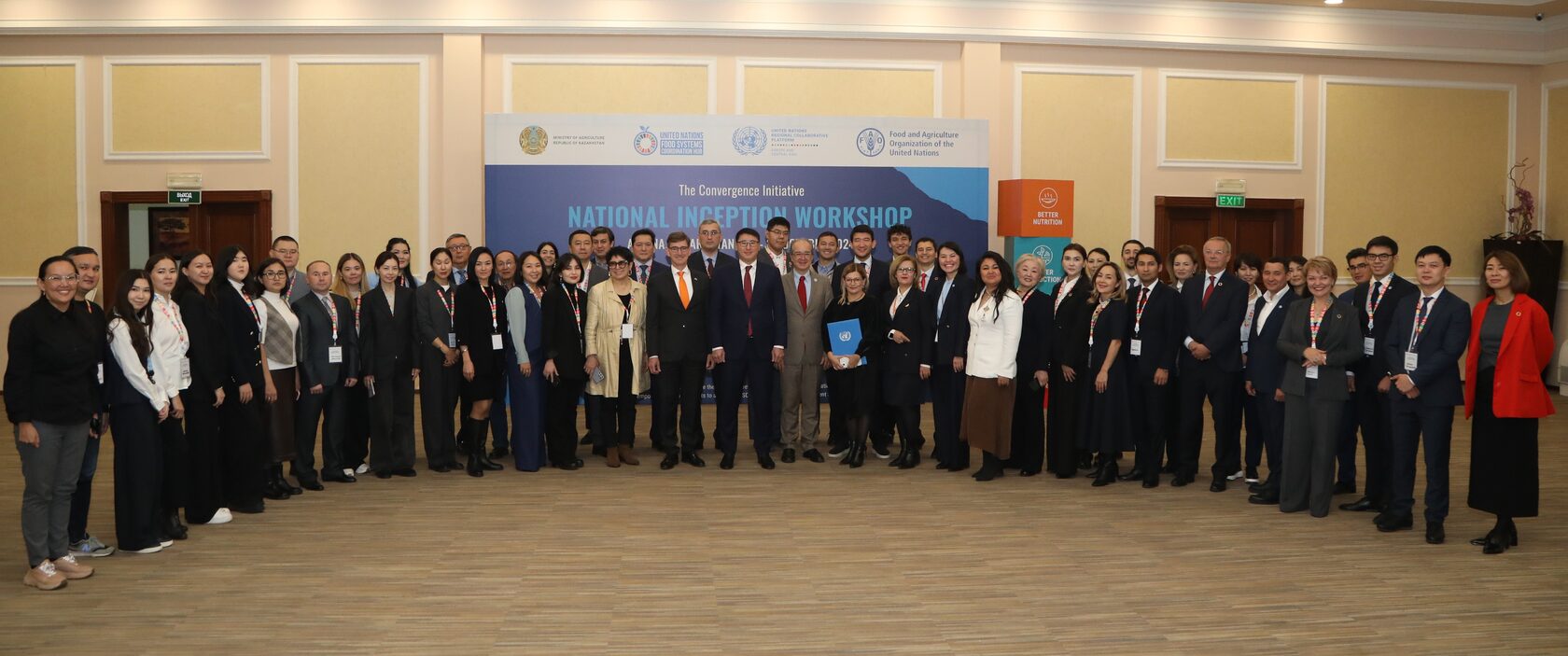On October 23-24, a National Inception Workshop for the Convergence Initiative took place in Astana, Kazakhstan, marking a significant step in aligning food systems transformation with climate action.
The workshop, organized in collaboration with the UN Food Systems Coordination Hub, Kazakhstan’s Ministry of Agriculture, the UN Issue-Based Coalition on Sustainable Food Systems (IBC-SFS), and the Food and Agriculture Organization (FAO), brought together key food systems actors, including policymakers, technical experts, private sector leaders, youth, and civil society. This diverse group united to develop a practical roadmap for action, highlighting Kazakhstan's leadership in modernizing agricultural systems while addressing the broader climate crisis.
The Convergence Initiative aims to support national efforts to advance the alignment between the “food systems transformation” and “climate action” agendas to enable governments and relevant actors at the national level to strengthen synergetic action that will simultaneously support the achievement of the Sustainable Development Goals (SDGs) and the Paris Climate Agreement. To operationalize and ground the Convergence Initiative in different country contexts and realities, the UN Food Systems Coordination Hub supports pilots in selected countries across the globe. Kazakhstan will be the first pilot country in Europe and Central Asia, providing an opportunity to capitalize on the important strides and progress made on the food systems and climate action agendas. The pilot will be implemented in close collaboration with the Ministry of Agriculture of the Republic of Kazakhstan, the National Convenor, and the UN Issue-Based Coalition on Sustainable Food Systems (IBC-SFS).
Malika Tazhmuratova, the manager of SDSN Kazakhstan, provided insights into the “Resilient Rangelands: Balancing Rural Economies and Ecosystem Integrity” project. This initiative, funded by the Science for Nature and People Partnership (SNAPP), involves SDSN Kazakhstan as a key participant in the working group. Together with other 16 institutions, the SDSN Kazakhstan will help explore the ways to optimize management of Kazakh and Mongolian rangeland ecosystems to harmonise objectives of nature conservation and agricultural development. The project outputs will result in spatial plans and management options to guide project delivery and provide evidence to develop supportive policy frameworks at national levels.
The workshop, organized in collaboration with the UN Food Systems Coordination Hub, Kazakhstan’s Ministry of Agriculture, the UN Issue-Based Coalition on Sustainable Food Systems (IBC-SFS), and the Food and Agriculture Organization (FAO), brought together key food systems actors, including policymakers, technical experts, private sector leaders, youth, and civil society. This diverse group united to develop a practical roadmap for action, highlighting Kazakhstan's leadership in modernizing agricultural systems while addressing the broader climate crisis.
The Convergence Initiative aims to support national efforts to advance the alignment between the “food systems transformation” and “climate action” agendas to enable governments and relevant actors at the national level to strengthen synergetic action that will simultaneously support the achievement of the Sustainable Development Goals (SDGs) and the Paris Climate Agreement. To operationalize and ground the Convergence Initiative in different country contexts and realities, the UN Food Systems Coordination Hub supports pilots in selected countries across the globe. Kazakhstan will be the first pilot country in Europe and Central Asia, providing an opportunity to capitalize on the important strides and progress made on the food systems and climate action agendas. The pilot will be implemented in close collaboration with the Ministry of Agriculture of the Republic of Kazakhstan, the National Convenor, and the UN Issue-Based Coalition on Sustainable Food Systems (IBC-SFS).
Malika Tazhmuratova, the manager of SDSN Kazakhstan, provided insights into the “Resilient Rangelands: Balancing Rural Economies and Ecosystem Integrity” project. This initiative, funded by the Science for Nature and People Partnership (SNAPP), involves SDSN Kazakhstan as a key participant in the working group. Together with other 16 institutions, the SDSN Kazakhstan will help explore the ways to optimize management of Kazakh and Mongolian rangeland ecosystems to harmonise objectives of nature conservation and agricultural development. The project outputs will result in spatial plans and management options to guide project delivery and provide evidence to develop supportive policy frameworks at national levels.

The workshop became the first step and an important milestone of the pilot in Kazakhstan, to review national needs, discuss priorities, and agree on means to enhance synergetic action and policy coherence for food systems transformation and climate action.
